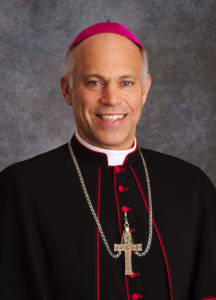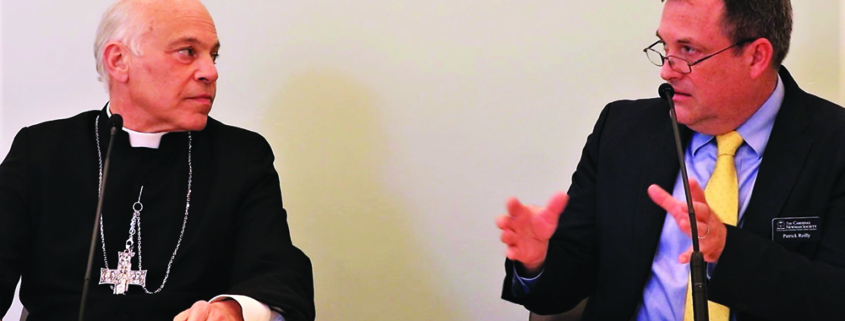Eucharistic Liturgy: A Q & A with Archbishop Cordileone
It was a special honor for The Cardinal Newman Society: in June, President Patrick Reilly had the opportunity to interview Archbishop Salvatore Cordileone in a public conversation about the renewal of sacred liturgy and Catholic education.

Archbishop Salvatore Cordileon
Archbishop Cordileone is a hero of ours. He has been a champion of faithful education, standing in support of clear moral standards for San Francisco’s Catholic school teachers. He also has a special dedication to traditional and reverent liturgy through his Benedict XVI Institute, which sponsors beautiful Masses and new sacred art and music, and as ecclesiastical advisor to our Task Force for Eucharistic Education.
One of the pillars of our Task Force is renewing Eucharistic liturgy: improving music, prayer, and reverence in Catholic school and college liturgies. So when Archbishop Cordileone hosted the international Sacra Liturgia conference near San Francisco last June—featuring former Vatican officials Cardinal Robert Sarah and Cardinal George Pell—we jumped at the chance to co-sponsor the event and present a special session with the Archbishop. Here are some excerpts.
Reilly: Let’s start with this concept of Eucharistic education. The Vatican’s documents on Catholic education have made it clear that the sacraments—both participation in the sacraments and also formation of students to receive sacraments—are foundational to an authentic Catholic education. Yet the surveys show that upwards of 70 percent of young adult Catholics today do not believe in the Real Presence of Christ in the Eucharist.
Thinking particularly about Catholic education—Catholic schools, Catholic homeschooling, college level—what immediate priorities would you recommend for improving a Eucharistic education in our Catholic institutions?
Abp. Cordileone: We need to make sure the catechesis is correct, is solid, is convincing. But catechesis is more than what’s taught with words. It’s what is experienced. It’s what is lived. It’s especially how our worship is conducted. And it’s the culture of the whole school.
I would focus then on renewing the liturgical life in the school and focusing on the ars celebrandi which, as [Cardinal Sarah] pointed out, is not just the celebrant of the Mass, but it’s everyone. Everyone has a role in the Mass so that it’s celebrated properly. What kind of music is sung? What are the movements like? Are those who serve the Mass, are they taught to present themselves reverently, to walk gracefully with true liturgical sense? These are little things, but they add up, and they create a sort of an atmosphere…
I mean, there are so many riches the Church has to offer. …This is a Catholic birthright, all the beauty the Church has to offer the world. We need to open up these treasures to young people.
Reilly: Catholic intellectual development is also a birthright. It’s a right of baptism to be able to understand the world and understand reality through the light of our faith. Is there something that maybe more needs to be done in terms of the Church fully embracing the different modes of education, the growing variety of types of education, and not being stuck in one particular model?
Abp. Cordileone: I do believe we need more sort of versatility in the forms of education. I think we’re still trying to transition into a new reality, although we are making progress. But you can’t replace the idea of schools run by religious orders—nuns and brothers and priests…
The Church has, I think, been slow to enthusiastically embrace homeschooling, because we’re so invested in our schools. It’s part of our Catholic identity as Catholics in the United States. We are so proud of our Catholic school system and we’re very invested in that. So I think we’ve been a little bit reticent. But I like the hybrid idea, supporting parents who want to educate their children at home, but having opportunities for them to come together.
Reilly: The Vatican recently issued a document on Catholic education—on Catholic identity in our schools. One of the major emphases of that document was on the witness and the formation of the teacher. And so, when we talk about Eucharistic education, trying to teach young people to behave as if the reality of Christ is within them, how important is it that Catholic educators themselves model this Eucharistic lifestyle?
Abp. Cordileone: It reminds me of that now oft-quoted line of Pope St. Paul VI from Evangelii Nuntiandi, about how the world looks for witnesses more than teachers, and if it looks for teachers, it’s because first they’re witnesses. The teachers do have to be a witness to the identity and the mission of the school. …It’s forming the culture of the school, so that people who appreciate that culture will be drawn to it, and those who don’t will be repelled by it…
School departments have to be very careful about whom they hire in any discipline… not just in religion courses, philosophy courses, but in every discipline. And to try to actively recruit from, again, the good and faithful Catholic colleges and universities.
Reilly: Your Excellency, we certainly appreciate your example and your strength in continuing to improve Catholic education and to bring the faith to as many young people as possible. So thank you, and God bless you!

